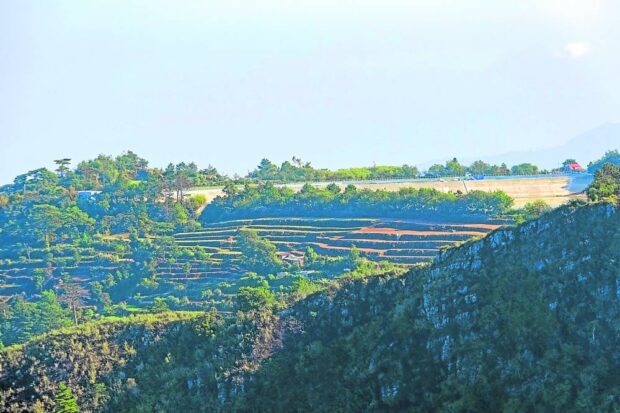Storm fills up water reservoirs in Baguio

CATCH BASIN | The Mt. Cabuyao Catch Basin, as seen from Mt. Santo Tomas in this photo taken on April 30, 2023, is a major rainwater reservoir of Baguio City that helps the local water district keep the taps flowing during the summer months or when a prolonged dry spell occurs. (File photo by NEIL CLARK ONGCHANGO / Inquirer Northern Luzon)
BAGUIO CITY, Benguet, Philippines — Like the country’s huge dams, local water reservoirs such as the city’s Santo Tomas Rain Basin recorded high elevations from rains dumped by Typhoon Egay (international name: Doksuri), which would help the countryside prepare for the projected El Niño drought toward the end of the year, the Baguio Water District (BWD) said.
The city’s biggest reservoir measured 10.70 meters above sea level (masl) as of July 28, which rose from 8.91 masl when Egay first lashed through the summer capital on July 26, and the 9.74-masl measurement on July 27, said BWD manager Salvador Royeca on Saturday.
Built by US engineers for the American colonial government, the 12-meter-deep Santo Tomas reservoir has the capacity for 700,000 cubic meters of water, and is often held in reserve for the dry season when supply runs short in parts of the city.
Under BWD’s El Niño plan, the Santo Tomas supply would be conserved in anticipation of a prolonged dry spell that had been forecast to last until the first months of 2024.
BWD also observed a similar increase in the elevation of the water harvesting dam within the city’s Busol Watershed.
Article continues after this advertisementRation
Water is rationed in parts of the overcrowded city, which now has a population of 366,358 residents. BWD has 63 deep wells, two rain harvesting dams, four open spring sources and 77 pumping stations to serve 46,726 Baguio households and businesses.
Article continues after this advertisementRoyeca said BWD intends to develop 10 deep wells annually to augment supply. BWD also completed the drilling operations for an experimental project that would manually divert runoff rainwater down into Baguio’s aquifers, he said.
Citing data, Royeca observed that the natural process for recharging Baguio’s underground water sources has been slow because of Baguio’s limited open spaces. Most of the city’s downtown and residential zones had been paved or occupied by massive buildings.
BWD has been working with research group Program Boondock, which is developing an “artificial rainwater recharge well” at Burnham Park that would “inject” rainwater straight to the underground water table, Royeca said. A similar project was put up at the strawberry fields of La Trinidad, Benguet’s capital town and vegetable trading center.
These benefits, however, have not negated the impact of Egay’s extremely strong winds and rain, which claimed nine lives in the Cordillera.